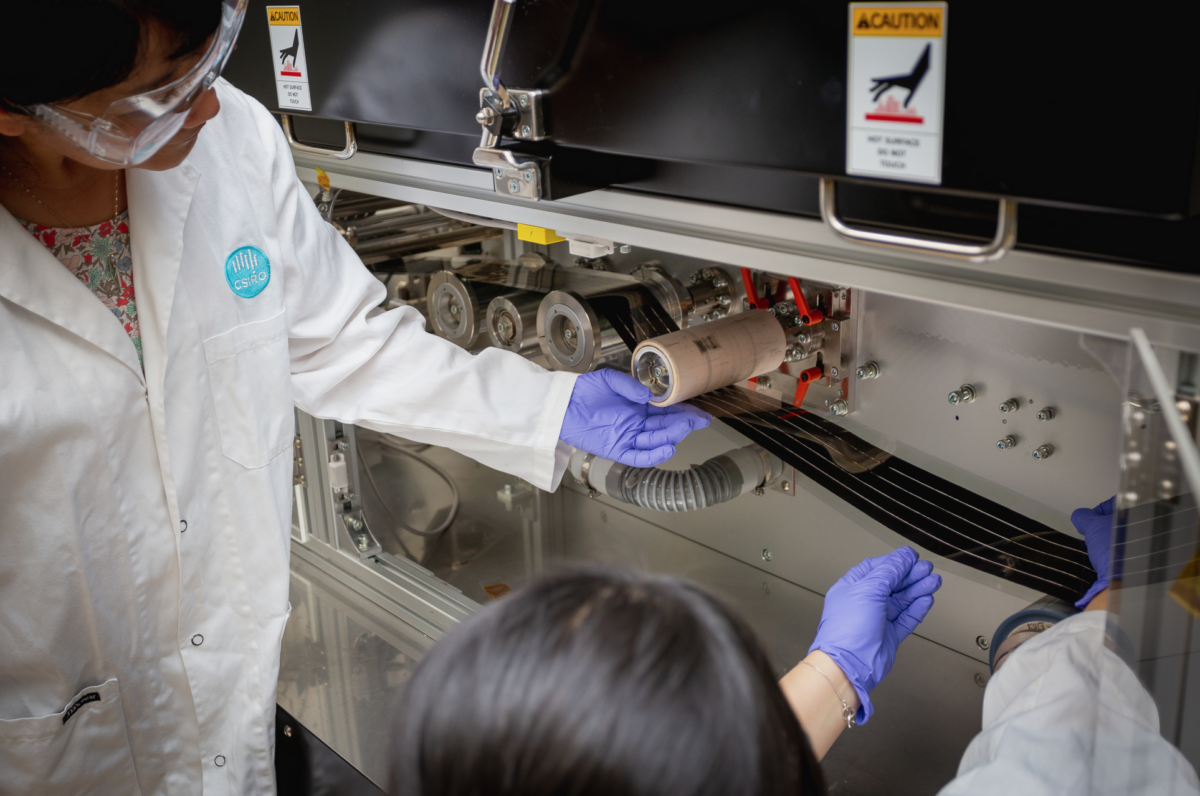After more than a decade of research and development, an international team of scientists at the CSIRO have achieved record results with thin and lightweight solar cells made from roll-to-roll printing. Since these methods are already widely used in the printing industry, production is significantly more accessible for manufacturers, with wide-ranging economic benefits.
The team of CSIRO scientists have collaborated with researchers from the University of Cambridge, Monash University, the University of Sydney, and the University of New South Wales, and their findings have now been published in the scientific journal Nature Communications.
Here, the team of scientists report the first demonstration of hybrid perovskite solar cell modules with serially interconnected cells that have been entirely produced using industrial roll-to-roll printing tools under ambient room conditions. These lightweight, thin, and flexible cells show power conversion efficiencies of up to 15.5% for individual small-area cells and 11.0% for serially interconnected cells in large-area modules.
Although these efficiency factors are below what perovskite solar cells can achieve in rigid cell structures, CSIRO’s Renewable Energy Systems Group Leader, Anthony Chesman, explains, “As these perovskite solar cells are printed onto plastic films, they are very lightweight, highly flexible and portable.” This means they can be deployed in hitherto untenable operative environments across urban construction, mining operations, emergency management, disaster relief, space, defence and personal electronics.
Earlier this month, the cells were sent to space as part of the Space X Transporter-10 mission. Organic-inorganic hybrid perovskite solar cells (PeSCs) are garnering much attention from the solar community. As thin-film semiconductors, perovskites are more widely predicted to play a role in upcoming electric vehicle batteries, sensors, and lasers, among other things.
While this promising next-generation photovoltaic technology has a demonstrated power conversion efficiency (PCE) of 26.1%, perovskites suffer well-documented challenges with commercialisation and scaling up their production. While high efficiencies have been produced in lab conditions, these have proved difficult to replicate in production.
Researchers from the Centre of Excellence in Exciton Science based at RMIT, Monash University, and CSIRO recently reported they have been able to remove the element of human error with the help of artificial intelligence (AI) in rapidly developing perovskite solar cells.
Now, with this latest breakthrough with roll-to-roll perovskites, “CSIRO’s thin and lightweight solar cells are now on the cusp of emerging from the lab to create clean energy in the real world,” said Chesman.
Such roll-to-roll printing of solar cells enables manufacturing on very long, continuous rolls of plastic, which can dramatically increase the rate of production, Chesman explains. Since this kind of printing is already widely used in the printing industry, such solar cells are radically more accessible for Australian manufacturers, holding the potential to create significant economic and environmental benefits.
CSIRO Principal Research Scientist Doojin Vak said that an automated system produced a comprehensive dataset that forges a path for the use of machine learning in future research.
“We developed a system for rapidly producing and testing over ten thousand solar cells a day – something that would have been impossible to do manually,” Vak said.
The prospect of unlocking the economic benefits of perovskite cells is now within reach. The next step for the CSIRO team is to work with industry partners to further develop and commercialise this flexible and highly adaptable photovoltaic breakthrough.
This content is protected by copyright and may not be reused. If you want to cooperate with us and would like to reuse some of our content, please contact: editors@pv-magazine.com.








By submitting this form you agree to pv magazine using your data for the purposes of publishing your comment.
Your personal data will only be disclosed or otherwise transmitted to third parties for the purposes of spam filtering or if this is necessary for technical maintenance of the website. Any other transfer to third parties will not take place unless this is justified on the basis of applicable data protection regulations or if pv magazine is legally obliged to do so.
You may revoke this consent at any time with effect for the future, in which case your personal data will be deleted immediately. Otherwise, your data will be deleted if pv magazine has processed your request or the purpose of data storage is fulfilled.
Further information on data privacy can be found in our Data Protection Policy.